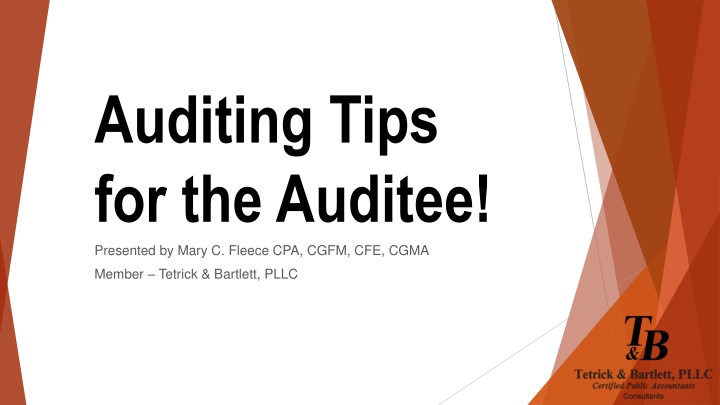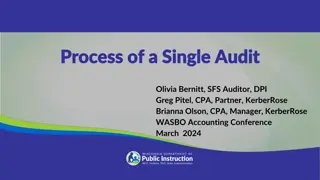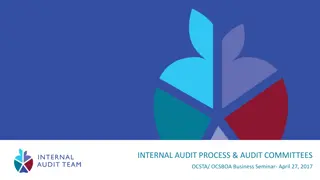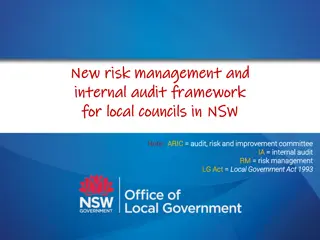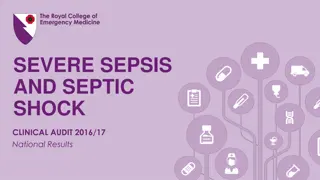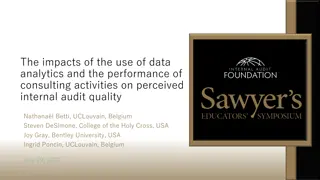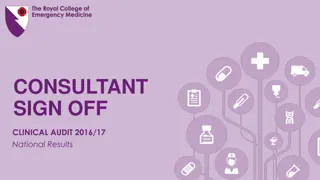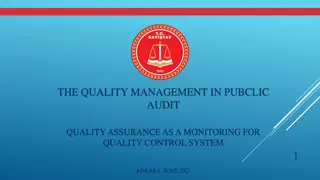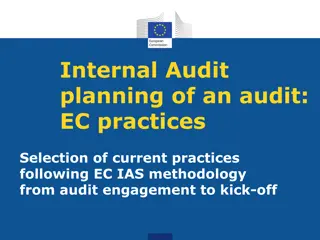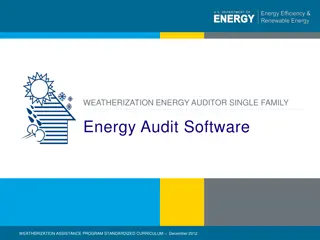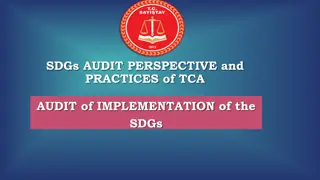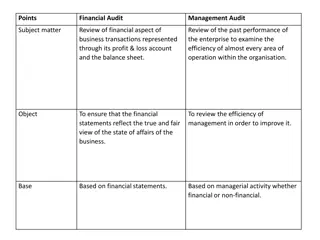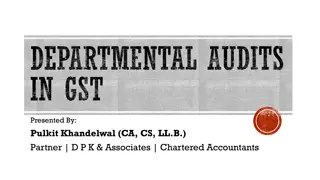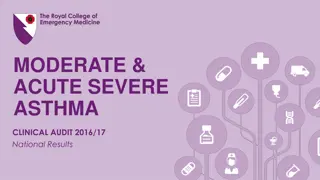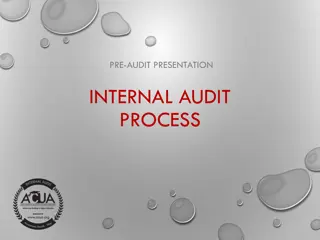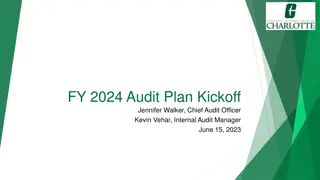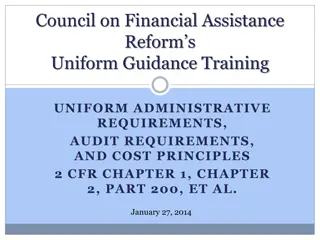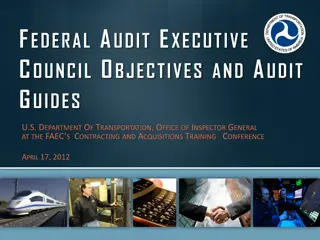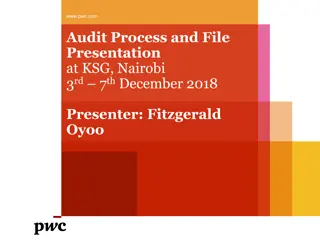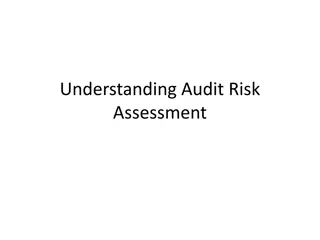Essential Tips for a Successful Audit Process
Learn key insights for effectively preparing and participating in an audit process, including understanding annual audit requirements, the importance of the initial steps, maximizing the audit process, and crucial steps for a successful audit. Gain a comprehensive overview to streamline your organization's audit experience.
Download Presentation

Please find below an Image/Link to download the presentation.
The content on the website is provided AS IS for your information and personal use only. It may not be sold, licensed, or shared on other websites without obtaining consent from the author.If you encounter any issues during the download, it is possible that the publisher has removed the file from their server.
You are allowed to download the files provided on this website for personal or commercial use, subject to the condition that they are used lawfully. All files are the property of their respective owners.
The content on the website is provided AS IS for your information and personal use only. It may not be sold, licensed, or shared on other websites without obtaining consent from the author.
E N D
Presentation Transcript
Auditing Tips for the Auditee! Presented by Mary C. Fleece CPA, CGFM, CFE, CGMA Member Tetrick & Bartlett, PLLC
Annual Audit Process Overview Every Year as of June 30, your BOE/ MCVC will be required to have an Annual Audit Due to the current threshold of $750,000 or more in Federal Expenditures All BOEs will be required to have Single Audit under the Uniform Guidance
First Step of your Audit Process If a CPA Firm is completing your audit you will have a 3- Part Signed Contract thru the West Virginia State Auditor s Office (Bid Process). If your BOE is audited by the WV State Auditor s Office, then this process is different. Signed Engagement Letter between your auditor and your BOE establishing the terms and the responsibilities of the audit engagement.
How can you make the MOST of the Audit Process? Grant your Auditor access to ALL the necessary financial and program records. Ensure that key staff personnel are available. Be actively involved! Understand what your auditor is requesting and how it effects the financial statements. Make the most out of your audit process by asking questions about your audit opinion, internal controls and compliance reports, management letters.
7 Steps to a Successful Audit
Step 1. Plan Ahead Devote time both prior to and in connection with year-end closing. Example, adjustments for indirect costs, agreement of and cash reconciliation to the WVEIS System, prior year s audit adjustments. By keeping schedules and reconciliations up-to-date during the period it could reduce the amount of time required at the end of the year. Proper planning should help to minimize anxiety and frustration.
Step 2. Stay up-to-date on accounting standards and if they apply New accounting pronouncements, as well as legislative and regulatory requirements, may affect your annual audit. If they do, then you will need to complete some advance planning on how to manage and track the information that applies to your financial statements. Example, Schedule of State Grant Receipts and Expenditures, Net Pension Liability, OPEB Schedules, Capital Asset Appraisal.
Step 3. Learn from the past audit Review prior audit adjustments and determine if the same entries will need to be made for the current period such as accounts payable, receivables, deferrals. Have all supporting documentation for the ENTIRE period, such as all bank statements, check images, certificate of deposit activity.
Step 4. Organize data Create a folder or book, a flash drive, or other areas to have audit schedules that can be accessed by personnel and/or auditors to assist in making it easier to retrieve schedules and other documentation to support the financial statements. Sometimes when this information is not readily available it can slow down the audit process.
Step 5. Perform a self-review Once the year-end closing entries have been made to WVEIS, review the accounting schedules and workpapers to ensure amounts agree to and are reconciled to the WVEIS system. Take a step back and analyze the overall financial statements for reasonableness. Review the notes to the financial statements as well to ensure that they are complete and reasonable. Be prepared to explain and support the financial statements.
Step 6. Be available during the audit fieldwork Some of the schedules and workpapers may have already been requested by the auditors prior to the start of the audit fieldwork. Please understand that the auditors will most likely request additional supporting information, documentation, and explanations during the audit fieldwork. While the auditors are performing the audit fieldwork, discuss with them your plans for any planned meetings or scheduled time out of the office.
Step 7. Evaluate Results and Deadlines Maintain contact with the auditors during the time between the audit fieldwork and then the issuance of the audit. Agree upon dates to provide any missing supporting documentation or schedules. Also, follow-up on any third-party confirmations or correspondence such as attorney responses. Discuss potential audit findings or conclusions.
Other Considerations for Our Upcoming Audit ?? Make sure all prior year audit adjustments are made and the current year beginning balance balances accurately reflect these adjustments. Ask our auditor for a planning letter for information requested to have ready for the first day of the audit fieldwork. Inform the auditor of any changes that may potentially affect the audit. Inform the auditor of any key personnel changes at the BOE.
Issues related to COVID-19 as far as masks, workspace, social distancing with your BOE personnel. Possibility of virtual meetings if some Department Supervisors are working at home or other areas. Explain if key personnel will be unavailable during the audit fieldwork (leave). Access/admission to the BOE building.
Follow-up From Fieldwork Make sure that all third-party confirmations and responses are received. Such as bank correspondence or attorney responses. Summary Schedule of Prior Audit Findings Preparation of a Corrective Action Plan
Final Steps Review and approve or discuss the proposed adjusting journal entries Review a DRAFT of the audit which should include any audit findings, Summary Schedule of Prior Audit Findings and the Corrective Action Plan Completion of the SF-FAC Data Collection Form
Key Take-Aways BE ORGANIZED, please! Maintain complete schedules and documentation (entire year and some subsequent months). Make sure that the SF-FAC Data Collection Form with the Single Audit Clearinghouse is completed. This will include your completed audit. On July 1, start preparing for the next year s audit!
